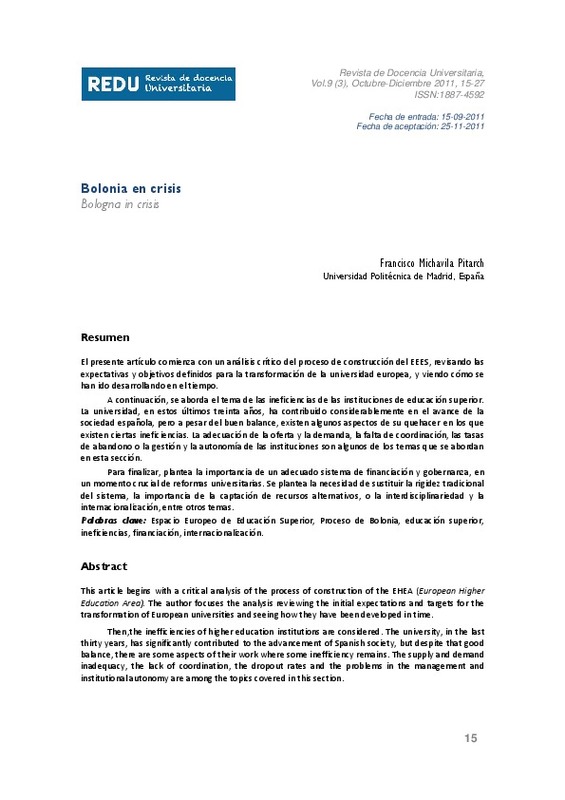|
Resumen:
|
[ES] El presente artículo comienza con un análisis crítico del proceso de construcción del EEES, revisando las
expectativas y objetivos definidos para la transformación de la universidad europea, y viendo cómo se
han ido ...[+]
[ES] El presente artículo comienza con un análisis crítico del proceso de construcción del EEES, revisando las
expectativas y objetivos definidos para la transformación de la universidad europea, y viendo cómo se
han ido desarrollando en el tiempo.
A continuación, se aborda el tema de las ineficiencias de las instituciones de educación superior.
La universidad, en estos últimos treinta años, ha contribuido considerablemente en el avance de la
sociedad española, pero a pesar del buen balance, existen algunos aspectos de su quehacer en los que
existen ciertas ineficiencias. La adecuación de la oferta y la demanda, la falta de coordinación, las tasas
de abandono o la gestión y la autonomía de las instituciones son algunos de los temas que se abordan
en esta sección.
Para finalizar, plantea la importancia de un adecuado sistema de financiación y gobernanza, en
un momento crucial de reformas universitarias. Se plantea la necesidad de sustituir la rigidez tradicional
del sistema, la importancia de la captación de recursos alternativos, o la interdisciplinariedad y la
internacionalización, entre otros temas.
[-]
[EN] This article begins with a critical analysis of the process of construction of the EHEA (European Higher
Education Area). The author focuses the analysis reviewing the initial expectations and targets for the
transformation ...[+]
[EN] This article begins with a critical analysis of the process of construction of the EHEA (European Higher
Education Area). The author focuses the analysis reviewing the initial expectations and targets for the
transformation of European universities and seeing how they have been developed in time.
Then,the inefficiencies of higher education institutions are considered. The university, in the last
thirty years, has significantly contributed to the advancement of Spanish society, but despite that good
balance, there are some aspects of their work where some inefficiency remains. The supply and demand
inadequacy, the lack of coordination, the dropout rates and the problems in the management and
institutional autonomy are among the topics covered in this section.
Finally, the author raises the importance, of an adequate funding and governance system in this crucial
time for university reforms. He points out the need to replace the traditional rigidity of the Higher
Education system ,the importance of having alternative funding sources, the need to value the
interdisciplinarity and internationalization of studies, among other topics.
[-]
|








